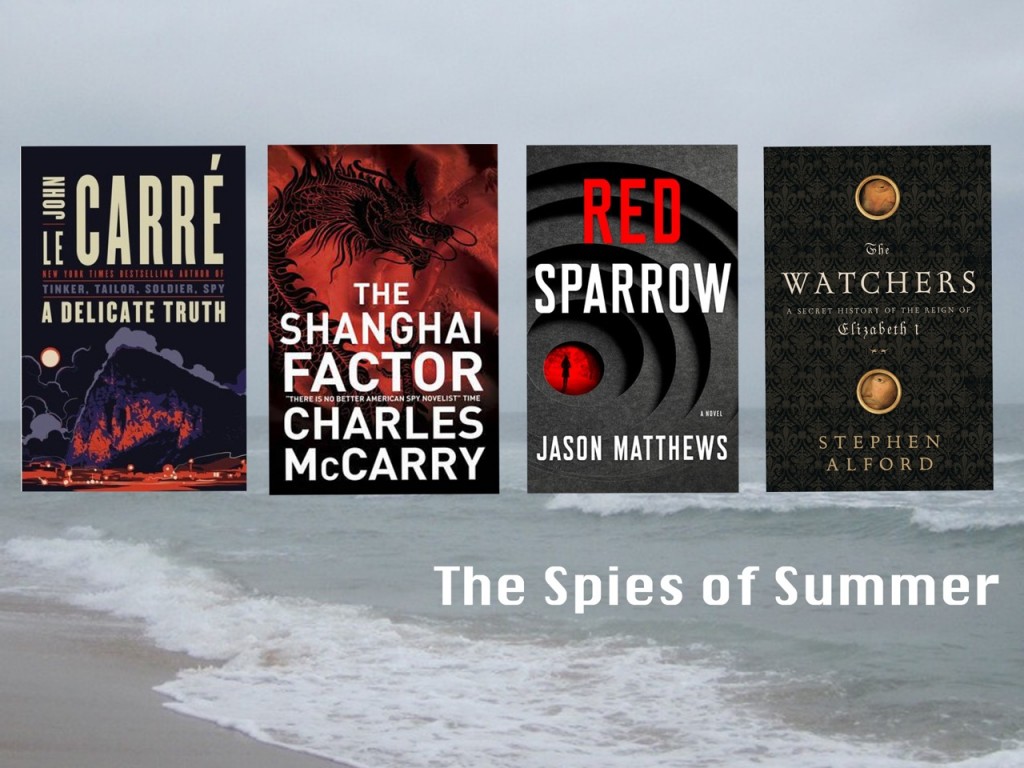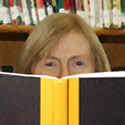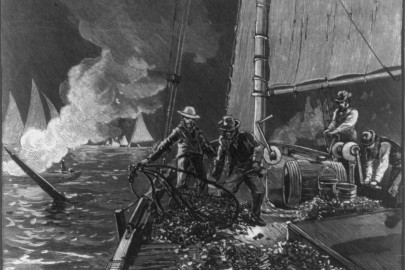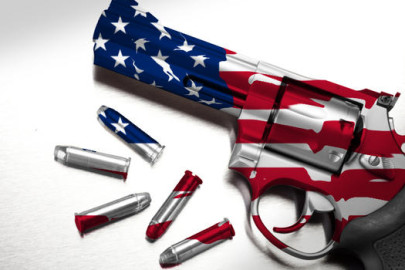Rita works her way through a summer’s worth of spy novels, and looks for parallels with real-life events…
Patriot or Traitor? That question has lingered over the summer as the Edward Snowden whistle-blower case has played out in front of the world’s media at Moscow Airport. Americans seem to be about evenly split on the question, as they are on so much else, with many feeling that life in Russia under the watchful eye of Vladimir Putin is a fitting punishment.
Meanwhile I’ve been exploring the patriot or traitor question in my summer reading, a trio of spy novels and yet another book on my long reading list about Elizabethan England. Here is what I learned about the state of play in the spy game.
First up is John Le Carre’s latest book, A Delicate Truth. Le Carre leaves the Cold War setting of his classic novels behind to write about the contemporary world of terrorists and arms dealers. But we don’t really see much of the terrorists; the real villains here are the Americans, who draw the British into a top-secret operation in Gibraltar that goes terribly wrong. Le Carre portrays the British spies and Foreign Office diplomats as a bunch of craven careerists and bungling idiots easily duped by the wily Americans. The only hero is Toby Bell, secretary to the Minister, who stumbles on the truth about the operation and must decide, at risk to his life of course, whether to be a whistle-blower in the cause of truth despite appeals to his patriotism. There is very little real suspense here and the plot creaks and groans. Would an ex-special forces military man really end up as a traveller selling leather crafts from the back of an old truck? It seems to be just a way to get him into the countryside so he can be recognized by Sir Christopher Probyn, the obtuse retired diplomat who was used as a cover of respectability for the operation. It is sad to report that the great John Le Carre has let his anti-American animus and seeming self-loathing of the British get in the way of his writer’s instincts. How I longed for George Smiley while I was reading this book. Those were the days when British spies, patriots or traitors, were at least brilliant at the game.
I turned next to Le Carre’s American counterpart, Charles McCarry, who has made a smoother transition to post-Cold War spy writing, perhaps because his specialty is China. McCarry spent years as an undercover CIA agent in Asia and the character Paul Christopher, who appears in a classic series of books beginning with The Meirnik Dossier, is surely an alter ego. But the main character in his latest novel, The Shanghai Factor, is the unnamed narrator, a young American spy living under deep cover in Shanghai, improving his Mandarin and waiting for a more specific assignment from his boss in a super secret unit within the CIA. He begins an intense relationship with Mei, a young woman who accidentally crashes into him on her bicycle. But was it an accident? Or is she a spy for the notorious Chinese secret agency, the Guoanbu? The narrator learns his hazardous assignment and the plot twists on to involve a ruthless Chinese businessman and the hunt for a mole in the CIA. Along the way there is plenty of sex and violence, double-crosses and betrayals, blurred lines between patriots and traitors, all the classic ingredients of the spy genre mixed expertly by McCarry. His deep knowledge of China lends an immediate authenticity to the book. While Le Carre’s effort seems tired, McCarry’s is as fresh as today’s news headlines about Chinese business and political scheming.
But the next spy novel I picked up, Red Sparrow by Jason Matthews, blew both Old Masters out of the water even though it is a first effort by the former CIA undercover agent. Here is a new classic in the Americans v. the Russians tradition, updated to the present, a dense, richly layered narrative with fully realized characters, an absorbing, suspenseful plot, and convincing details of spy tradecraft. Unlike so many lesser writers, Matthews actually gets the geography of the Washington area correct, including its outer suburbs, which makes his descriptions of Moscow and a host of other European cities all the more believable. The plot gets underway when the beautiful former Russian ballerina Domenika Egorova is recruited as a spy by her uncle and sent to “Sparrow School” where young women and men are taught the arts of seduction to entrap foreign agents. The scenes at the school, where the students watch pornographic videos and are instructed in everything from sexual techniques to making polite conversation at diplomatic soirees, veer from hilarious to horrifying. The chief instructor, a former madam with the values of the old Soviet era, is an inspired characterization and I couldn’t help seeing Helen Mirren playing the part in a future movie. (Sorry, Dame Helen). Once her training is complete Domenika is assigned to seduce Nate Nash, a handsome young CIA officer who is suspected of running a high-level mole inside the Russian Intelligence Service. Soon both Domenika and Nate are trying to recruit each other to their own side, a game that keeps everyone guessing as the search for the mole intensifies. Who are the patriots and who the traitors in this world? There are no simplistic answers here, as the spies follow their own code of honor and perhaps feel the greatest loyalty to their own kind. Those who betray their country feel that their country betrayed them first. Perhaps Edward Snowden feels this way. Vladimir Putin himself makes much more than a cameo appearance in Red Sparrow; in fact his portrait alone makes it worth reading the book. The conclusion is a masterful homage to John Le Carre’s The Spy Who Came in From the Cold, a reminder that the torch has been passed to a new generation of spy novelists.
Lest anyone think this retired librarian reads nothing but spy thrillers, let me hasten to assure you that I am also an avid history reader. It is hard to imagine now, but back in my university days I could write entire papers on such abstruse subjects as the Eucharistic theology of the Reformation. I’m sure I couldn’t manage a complete sentence on the topic now, but I have kept up my reading on the Tudors and Stuarts and the English Reformation. It was just a co-incidence that a history book I picked up this summer was also on the theme of spies, The Watchers: A Secret History of the Reign of Elizabeth I by Stephen Alford. Sir Francis Walsingham’s spy network working on Elizabeth’s behalf was pitted against spies for the Catholic powers of Europe and English Catholics who yearned to return their country to the true faith. English priests based on the continent were smuggled into England where they lived in hiding trying to foment a Catholic uprising and depose the Protestant Queen. The life of Elizabethan spies, known as intelligencers and pursuivants, was not so different from their later counterparts in MI6, the CIA, or the KGB. Disguises, cover identities, secret codes, underground communication networks, safe houses, and the ever-present fear of betrayal, exposure, and death. Then as now the definition of patriots and traitors depended on whom you asked. The young Catholic gentlemen Walsingham recruited as double agents were traitors to their faith and their families, but they were patriots in the eyes of the Elizabethan state. Catholic priests like the Jesuit Saint Edmund Campion, who was hanged, drawn, and quartered at Tyburn as a traitor, are revered as martyrs by Catholics. But in this book Campion comes across as a cold, scheming fanatic; his saintly reputation a construct of the propaganda pamphlets churned out by the underground Catholic press after his death. From the vantage point of several centuries later it is easy to wonder “can’t they just all get along?”
But we are mired in our present controversies and only history will prove how ridiculous they are. As to the question of the day about Edward Snowden, my summer reading gave me some insight into the matter. His fate is indeed ironic, in that by protesting a surveillance state he finds himself resident in the mother of all surveillance states. No one who reads Red Sparrow can doubt that Edward Snowden has Russian intelligence “sticking all over him like ticks” in Jason Matthews’ memorable phrase.













wow The Kills yesterday and now this great list of thrillers, plenty of good summer reading to be had here!
I suspect there is a great comic novel to be written about the absurd trio of Edward Snowden, Bradley Manning, and Julian Assange.